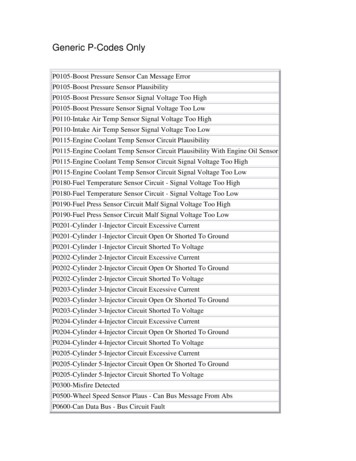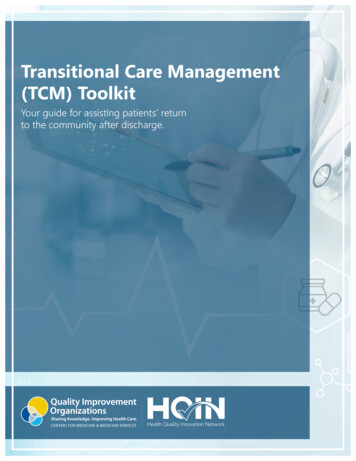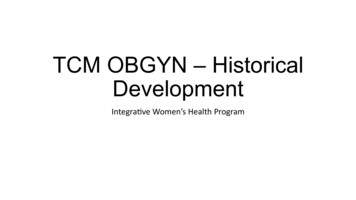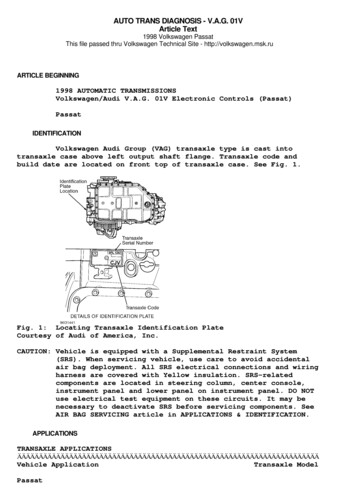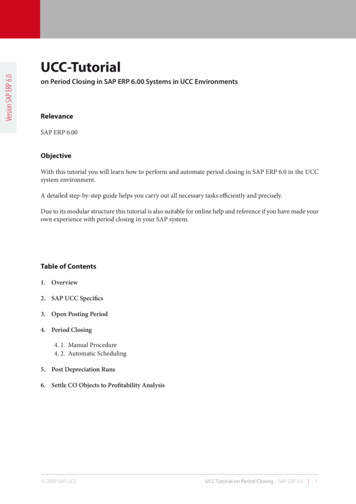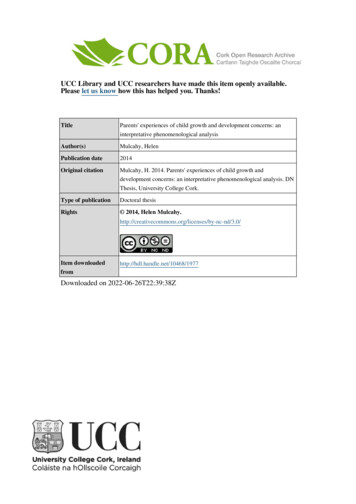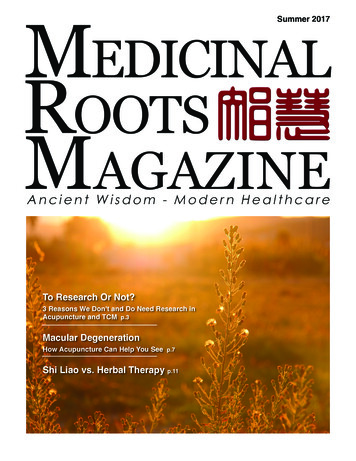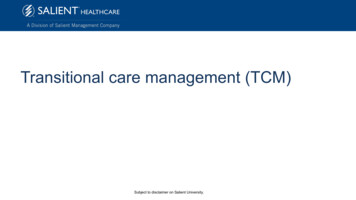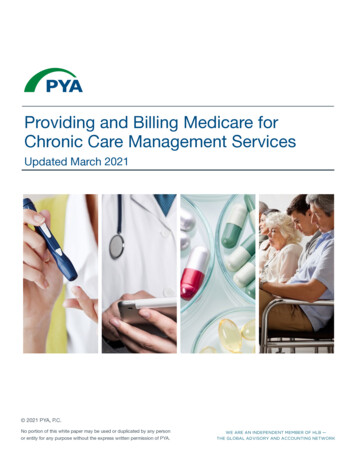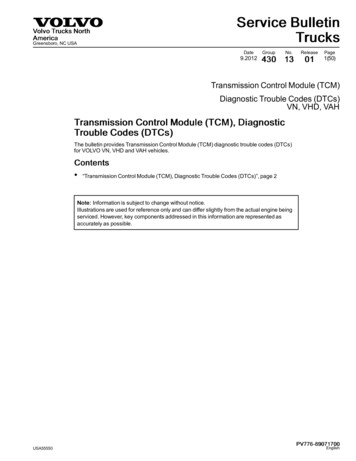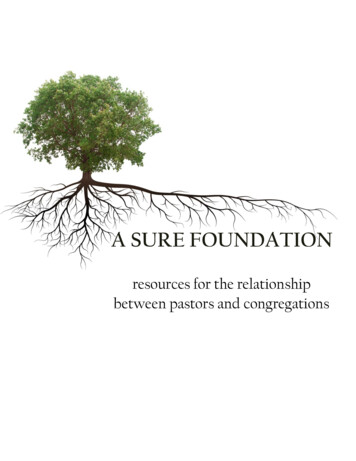
Transcription
A SURE FOUNDATIONresources for the relationshipbetween pastors and congregations
Produced by Ministerial Excellence, Support & Authorization (MESA) Ministry Team, 2018United Church of ChristPrint copies are available for purchase at uccresources.com.This resource’s articles are available as individual PDFs at ucc.org/ministers local-church-leaders.
TABLE OF CONTENTSethical codes 4o UCC Ministerial Codeo Local Church in Relation to Its Pastoro Behavioral Covenants for Congregationspastoral relations committee 13ooooTheological GroundingCommittee FormationBest PracticesCase Studies and Resourcesassessment of ministry 22ooooTheological GroundingHow to AssessRelationship to CompensationResourcessocial media guidelines 28oooooTheological GroundingExpectations of Pastor’s Online PresenceAdult-Minor Relationships on Social MediaSocial Media Boundaries for DepartureResourcessabbatical leave 35o Theological Grounding and Relational Valueo Policies and Best Practiceso Resources and Case Studiesethical departure guidelines 43ooooTheological GroundingBoundaries and Best PracticesThe Exit InterviewRetired Ministers in the Congregation2
INTRODUCTIONDear pastors and congregations,The Ministerial Excellence, Support & Authorization (MESA) Ministry Team of the UCCNational Offices is pleased to share this resource with you: a collection of best practices for therelationship between pastors and congregations. Whether you are entering a new pastoralrelationship with a congregation or seeking to deepen an existing relationship, these resourcessupport the healthy ministries of both pastor and congregation. A Sure Foundation includes toolsfor Pastoral Relations Committees, ministry assessment and evaluation, social media guidelines,sabbatical resources, departure ethics, and more, along with recommended resources foradditional guidance.It is our hope that this resource be widely used by ministers serving in local churches as well asthe leaders of those churches, striving together to be faithful in ministry. Many of these tools arebest practices, not prescriptions for a single course of action. We encourage adaptations that fityour context while remaining consistent with this guidance and with the United Church ofChrist’s Manual on Ministry.By encouraging healthy relationships between pastors and the congregations they serve, theseresources also serve to support the relationship with the local Associations. While pastors arecalled and employed by congregations, their ministerial standing in the United Church of Christis maintained through Associations, which communicate the expectations for professionaldevelopment through Committees on Ministry. Congregations also hold their standing in theUnited Church of Christ through their Associations. Therefore these resources assume asfoundational the covenantal obligations between ministers, congregations, and Associations.Many individuals and congregations offered feedback for these resources, and we are grateful fortheir time, energy, and support of this project. We are also grateful for you and for your ministryon behalf of the United Church of Christ, and we hold you in prayer with faith.The Ministerial Excellence, Support & Authorization Ministry Team3
ETHICAL CODESin this sectiono UCC Ministerial Code (Manual on Ministry, 2018 edition)o Local Church in Relation to Its Pastor (Manual on Ministry, 1986 edition)o Behavioral Covenants for Congregationsucc ministerial codeAll persons with ministerial standing in the United Church of Christ are expected to abide by theUCC Ministerial Code.I acknowledge as the Church’s sole Head, Jesus Christ, Son of God and Savior, and as kindred inChrist all who share in this confession. I will look to the Word of God in the Scriptures, and tothe presence and power of the Holy Spirit, to prosper its creative and redemptive work in theworld.1Affirming that I have been called by God to be a minister of the Lord Jesus Christ and grantedministerial standing by the United Church of Christ, I agree to preach and teach the gospel, toadminister the sacraments and rites of the Church with integrity, and to exercise pastoral care andleadership in covenant with others.Relying on the grace of God, I COVENANT WITH GOD TO:o Lead a life worthy of the calling to which I have been called.o Demonstrate a sincere yearning for connection with the triune God, expressed in prayer,worship, Bible study, retreat, and other spiritual practices.o Affirm the importance of discernment in relationship to my call and, using the Marks ofFaithful & Effective Authorized Ministers, will continue to discern the nature of my call incommunity.1Preamble to the United Church of Christ Constitution4
o Grow in faith, knowledge, and the practice of ministry through intentional continuingeducation, study, and devotional life.o Cultivate a culture of call by nurturing the gifts of others in the Church and joining their giftswith mine in seasons of change and continuity for the sake of the mission of Jesus Christ andthe health of the Church.o Honor the diversity of God’s creation and work for the unity of the body of Christ (John17:21).o Recognize the communal nature of God, ensuring that ministry does not happen in isolation.COVENANT WITH SELF AND FAMILY TO:o Attend to my physical well-being by adopting a healthy life style including diet, exercise, andrest, setting aside time for Sabbath and vacation.o Steward my time, talents, and personal financial resources responsibly.o Accept responsibility for all debts that I incur.o Refrain from abusive behavior including abusive behavior toward others; the abuse ofalcohol, drugs, or any other substance; to seek appropriate care for physical and mentalhealth concerns; and to avoid addictive behaviors.o Engage in sexually healthy and responsible behavior.o Honor my family commitments, including my family’s need for privacy and time together.o Develop and maintain meaningful personal relationships outside of my ministry setting.COVENANT WITH THE UNITED CHURCH OF CHRIST TO:o Actively participate in the covenantal life and work of all settings of the United Church ofChrist.o Adhere to all requirements for maintaining ministerial standing as set forth by myAssociation, and abide by the terms of my call agreements and covenants with energy andvitality.o Seek the counsel of others, including Conference staff and/or the Association Committee onthe Ministry, should divisive tensions threaten my relationship with those with whom Iminister.o Serve as an ambassador for the United Church of Christ, and participate in activities thatstrengthen its mission, vision and purpose.o Advocate for fair standards of compensation for all ordained and lay employees of theChurch, and honor the search and call process of the United Church of Christ.o Seek to know, understand and respect the diversity of opinions and people within the UnitedChurch of Christ, affirming that all settings of the UCC speak to the church and not for it.o Encourage and participate in the evaluation of my ministry, understanding and demonstratingthat ministry is of and for the Church as it seeks to advance God’s mission in the world.5
COVENANT WITH MY MINISTRY SETTING TO:o Preach and teach the gospel without fear or favor, regarding all persons with equal respectand concern, and undertaking to minister impartially.o Honor all confidences shared with me; telling only those who need to know, what they needto know, when they need to know it.o Steward church funds and property faithfully, while overseeing the administrative tasks ofministry with integrity.o Speak the truth in love, not using my position, power, or authority to exploit any person norusing my position for unwarranted personal gain, including financial gain.o Assess with care the implications of accepting gifts from congregation members.o Not perform pastoral services within a congregation or for a member of a congregation,without the invitation of the current pastor of that congregation.o Neither interfere with nor intrude upon the ministry of my successor upon my departure froma ministry setting; and to deal honorably with the record of my predecessor and successor.COVENANT WITH ALL MINISTERS TO:o Work cooperatively and collegially, with intercultural awareness.o Stand in mutual relationships with colleagues in ministry, offering and receiving counsel andsupport with intentionality.o Use technology and social media responsibly.o Act to prevent and to report known or suspected cases of physical or sexual abuse or neglect.o Attribute the sources of words and ideas that are not my own.o Accurately represent my professional qualifications, education, experience and affiliations,acknowledging the limitations of my office, abilities, skills and competencies, and makingreferrals when necessary and/or appropriate.o Maintain appropriate boundaries and practice self-differentiation in both my personal andprofessional life, including within the Local Church where I hold membership.6
the local church in relation to its pastorTHE MINISTRYThis local church recognizes itself as a part of the people of God and fulfills its purpose as itbecomes a community for ministry and mission. We recognize our pastor as a person called byGod who has attained particular skill and competence in leading our local church in fulfilling itsmission and ministry.We have called our pastor to preach and teach the gospel, to administer the sacraments and ritesof the Church, and to exercise pastoral care and leadership. As we expect the pastor to beresponsible in preaching and teaching the gospel and in administering the sacraments and rites,so will we be responsible for receiving and heeding the Word of God that comes through theproclamation of the gospel and the celebration of the sacraments and for responding to thepastoral care and leadership offered.PARTNERSHIP IN MINISTRYWe believe that the ministry and mission of the Church are given to all baptized Christians. Wewill nurture and join our gifts for ministry with those of the pastor in the Church and in theworld.In all matters pertaining to the life, organization, and mission of this local church, we will workcooperatively and collegially with the pastor. We recognize that our church and our pastor arepart of the larger faith community that is the United Church of Christ, and we will be and willsupport our pastor in being responsible participants in our Association, the Conference, and theUnited Church of Christ.We recognize that our church and our pastor are part of the Church Universal, and we will beand will support our pastor in being responsible participants in ecumenical activities in order tostrengthen the unity, witness, and mission of the Church everywhere.THE ETHICS OF MINISTRYWe will regard all persons with equal respect and concern and will support and expect our pastorto undertake to minister impartially. We will not discriminate against any person, group or7
organization on the basis of race, gender, age, sexual orientation, faith, nationality, ethnicity,marital status, or physical, mental, or emotional disability.We recognize that we have called our pastor as the pastoral leader of this local church, and wewill not invite other pastors to provide pastoral services within this church or to members of thischurch without our pastor’s consent.We recognize and respect that our pastor receives confidential and privileged communication.We will establish policies regarding baptism, communion, marriages, funerals, and the use ofchurch facilities and personnel in consultation with our pastor and will honor them in our life asa local church.We respect the privacy of the pastor’s family and the family’s right to time together withoutinterruption.We do not expect the pastor’s family to assume roles of leadership or levels of involvementbeyond the family’s wishes.We recognize that conflict or tension between our pastor and the local church can arise. Shoulddivisive tensions threaten our life together, we will seek the counsel of the Conference orAssociation Minister or the Association Committee on the Ministry.COMMITMENTS IN MINISTRYWe recognize the many and diverse expectations we have of our pastor, and we will offer oursupport through prayer, encouragement, and partnership in the ministry of this church.We recognize our responsibility to provide our pastor with adequate compensation and fringebenefits. We will make these decisions in consultation with our pastor and in light of thecompensation guidelines established by our Conference. We will provide for an annual review ofcompensation that considers effectiveness, cost of living, ministerial competence, and years ofservice.We recognize our pastor’s need for physical and spiritual renewal, and we will provide adequatetime and resources for study, devotion, leisure, vacation, and sabbatical.Relying on the grace of God, we will lead lives worthy of the calling to which we have beencalled.8
behavioral covenants for congregationsTHEOLOGICAL GROUNDINGGod calls us into holy relationship with one another, sharing our joys and sorrows, building eachother up in truth and love, and exhorting us to forgive and seek forgiveness. The Bible is full ofpassages and stories that speak to these values, particularly in a congregational context. Inparticular, Matthew 18 and Ephesians 4:15 are commonly cited to outline the importance ofhonest, direct communication within a congregation. How people treat one another within thechurch reflects on how people tend to treat others outside the walls of the church.Much of the time, congregants treat each other with kindness and grace, observing boundaries ofappropriate behavior and striving to respond to conflict faithfully. Such graces include theimportance of telling one’s own truth and listening respectfully to others’ truths, holdingconfidences appropriately, assuming good intent, seeking reconciliation directly from one whohas hurt another, and approaching matters in a spirit of prayer. Sometimes, however, certainbehaviors undercut the values the congregation professes to hold, such as gossip, slander,“parking lot” conversations that denigrate decisions made or those who made them, andinappropriate comments to or about one another (including pastoral leadership or the widerchurch).OVERVIEWBehavioral Covenants provide the opportunity for a congregation to name its best values aroundcommunication and conflict. These covenants work best when they are rooted in the core valuesand mission of the congregation, and when members have the opportunity to participate in thecovenant’s creation and periodic renewal. The true power of a Behavioral Covenant, however,comes from the congregation’s willingness to hold each other accountable to that covenant.When someone acts contrary to the Behavioral Covenant, church leadership must be willing torefer back to this shared document, to say, “This behavior is not appropriate,” and to mutuallycreate a plan for reconciliation.Behavioral Covenants describe norms for interpersonal behavior, outlining respectful face-toface conduct, appropriate conduct via email or social media, and norms for physical contact. Allphysical contact within the church must be respectful, consensual, and mutually welcome. The9
use of demeaning, sexually inappropriate, or unwelcome language or physical contact, regardlessof to whom it is directed, is inappropriate. 2Finally, Behavioral Covenants help congregations develop tools for working through challengingdecisions by placing the common good of the community at the forefront, rather than prioritizingan individual’s “wants” in any given situation. A Behavioral Covenant that prioritizes the healthand vitality of the community will prioritize those needs, even when that means making difficultdecisions. The goal is not for everyone to be happy but for everyone to be able to have a voice indecisions that affect the congregation.From time to time, a congregation may need to develop a Behavioral Covenant that is specific toone individual within the congregation. This may be because of legal requirements (such as aregistered sex offender who wants to join the church), previous conduct (such as abusive speechor conduct towards the pastor or others in the church), or for other reasons. These individualizedBehavioral Covenants should be consistent with the congregation’s Behavioral Covenant andtailored to the specific needs of the situation. Association or Conference staff should be aresource in the development of such a resource.SAMPLESThe Discernment Travelogue’s “Rules of the Road” 3 provide a faithful roadmap for the creationof such a document, as well as some excellent samples of what to include in a BehavioralCovenant:o Be fully present, extending and presuming welcome to and from others.o Listen generously and suspend judgment about another’s story. Hold stories with careand respect.o Author your own story and share your own gifts.o Wonder. Welcome discomfort. Love the questions.o Be mindful and respectful of time.o Practice hospitality and inclusion, especially when diverse cultures meet. There are manyexcellent methods for discernment but not all of them model intercultural awareness;therefore be discerning about discernment together: appreciate many ways of hearingGod together.o Believe that it is possible to emerge from our time together refreshed, surprised, and lessburdened than when we came.The Insurance Board’s Safe Conduct Workbench describes sexual harassment in detail and this resource may behelpful as congregations consider incorporating sexual harassment materials into their Behavioral Covenant; it isavailable here: http://www.insuranceboard.org/safety solutions/safe conduct workbench.aspx3The Discernment Travelogue is available here: ttravelogue?variant 17675334660 and is also available in Spanish and Samoan.210
Some congregations use Eric Law’s Respectful Communications Guidelines 4 as a model:oooooooR – take Responsibility for what you say and feel without blaming othersE – use Empathetic listeningS – be Sensitive to differences in communication/cultural stylesP – Ponder what you hear and feel before you speakE – Examine your own assumptions and perceptionsC – keep ConfidentialityT – Tolerate ambiguity because we are not here to debate. There are no “winners” or“losers.”One congregation modeled its Behavioral Covenant on scripture; it is shared here withpermission:“Love your neighbor as you love yourself” (Matthew 22:39). As we walk together in allGod’s ways made known or to be made known to us, we seek to discern and do what is bestfor our church as a whole, not what may be best for individuals or factions (Philippians2:4). We recognize that conflict and disagreement are normal and natural. We welcome awide variety of voices and ideas when they are expressed in a way that reflects God’s love.As followers of Jesus Christ we promise to respect each other at all times in the followingways:o We will approach all things in prayer. (1 Thessalonians 5:17)o We will speak from our own personal experience. (1 Corinthians 3:16)o We will speak face-to-face, honestly and without rancor when there is disagreement.(Ephesians 4:15)o We will listen with an open and non-judgmental mind and try as hard to understand as tobe understood. (Proverbs 4:7)o If we are unable to effectively communicate with each other, we will ask a third party tobe present to assist us. (Matthew 18:16)o We will support the final outcome of the decision-making process. (1 Corinthians 1:10)o As forgiven people, we will choose to forgive one another. (Luke 11:4) In the spirit ofJesus, and with God’s help, we will show respect and love in all we do as we journeytogether.4These guidelines are found here: ation-guidelines/ and are alsoavailable in Spanish, French, Chinese, and Korean.11
Another congregation calls its Behavioral Covenant a “Covenant for Christian Communication.”It too is shared with permission:As people called to follow our Lord and Savior Jesus Christ, we acknowledge His teaching inMatthew 18:15-17, 21-22 and the Holy Spirit’s leadership in Ephesians 4:15 concerningcommunication. As a Christian congregation in covenant with Christ as the Head of theChurch, we accept responsibility to make God’s teaching our watchwords.o When we hear something that raises concerns for us, we shall first make every effort tospeak directly, one-to-one with the person involved. A deacon or the pastor(s) may beasked to coach us in advance, or to be present to witness communication as Jesusspecifies at step two of the Matthew 18 process. If talking one-to-one or with one or twoothers fails, then concerns may be referred to the relevant group in the church or as a lastresort to the whole congregation.o In order to speak truth in love, we shall speak for ourselves using “I” statements, notclaim to represent others or use accusatory “you” statements.o When difficult subjects need to be named, we shall pray for all concerned and seekguidance of the diaconate and/or pastor(s) for help in speaking truth in love.o We accept that understanding and respecting each other does not necessarily meanagreeing with each other.o We affirm that the Holy Spirit may speak through any of us, so that all of us deserve arespectful hearing, even though congregational decisions are made by majority vote.o While all people are welcome in Christian communities, behavior that is unchristian (forexample: threatening, taunting, demeaning harassing or attacking) conflicts with Christ’steaching and will not be tolerated.While these covenants primarily focus on verbal behavior and listening, it is important to includecommitments to abide by other guidelines established by the congregation, including SafeConduct policies.Congregations that use their Behavioral Covenants faithfully still experience conflict anddisagreement, but they respond to those situations with a guideline that models respect, care, andChristian concern for the well-being of the entire body.12
PASTORAL RELATIONS COMMITTEEin this sectionooooTheological GroundingCommittee FormationBest PracticesResources and Case Studiestheological groundingThe pastoral office and other positions of staff leadership exist to build up the congregation aspart of the Body of Christ and to equip the saints for the mission of the church:And these gifts were that some should be apostles, some prophets, some evangelists, somepastors and teachers, to equip the saints for the work of ministry, for building up the body ofChrist, until we all attain to the unity of the faith and of the knowledge of Christ, to becomemature, to the measure of the stature of the fullness of Christ. (Ephesians 4:11-13)Ministers are called to embody and encourage the faith of the Church and its members. This callis lived out in relationship, whether clergy serve as pastors or chaplains, whether they arechairing committees or baptizing babies, whether they are meeting with colleagues or withcounselees. The particular relationship between a pastor and congregants should be tendeddeliberately, so that the ministries of both pastor and congregation complement each other andfurther God’s grace in the world. As with any relationship, it must be respected and nurtured togrow in healthy and productive ways. For this reason, a Pastoral Relations Committee exists in acongregation to advise, assist, and promote the growth of this vital relationship. The health of therelationship between the pastor and the congregation is not an end in itself but serves theministry of the congregation as a whole.Congregations and leaders should expect that conflict will occur. There is a difference, however,between healthy conflict that productively addresses values, expectations, and priorities, andunhealthy conflict that creates and multiplies divisions. When the pastor and congregation do notshare clarity about the values, expectations, and priorities for ministry, unhealthy conflict occurs.Additional Biblical texts offer insight about the health of the pastor-church relationship. ExploreActs 15, Romans 15:1-6, Galatians 6, and 1 Thessalonians 5:12-24 for a few examples.13
committee formationThe Pastoral Relations Committee is a standing committee in a congregation, with the purpose ofsupporting a healthy relationship between the pastor and congregants in order to enhance theeffectiveness of the church’s ministry. The committee serves in two primary ways:o as an advisory group to the pastor: sharing ideas, dreams, expectations, and concerns of thecongregation with the pastor;o as a support group for the pastor’s leadership: interpreting roles, functions, boundaries,opportunities, and needs of the pastor to the congregation.The goal of a Pastoral Relations Committee is to promote faithful, shared ministry between thepastor and the congregation.The committee works in a context of confidentiality, support, care, and honesty with the pastor,while promoting healthy communication in the congregation as a whole. A Pastoral RelationsCommittee is an appropriate and confidential place for the pastor to test possible goals for thecongregation’s life, to receive support for their professional development, to reflect on theiroverall well-being in ministry, to listen to feedback and strategize potential responses. Thiscommittee also provides a means for the congregation to express its care for the pastor byadvocating for appropriate compensation and encouraging times for relaxation, exercise,vacation, spiritual development, and personal relationships outside of the congregation.Particularly when the pastor serves in a part-time and/or bivocational capacity, this committeehelps both the pastor and the congregation set and maintain appropriate expectations about thescope of work. A Pastoral Relations Committee is not an appropriate place to circumvent churchprocesses of decision-making, for committee members to relay anonymous complaints, forindividual members to lobby for or enact their own ambitions for church life, or to empanel anadversarial group opposed to the pastor’s leadership. Finally, while the Pastoral RelationsCommittee encourages assessment of the shared ministry between the pastor and thecongregation, they do not lead the process of pastoral evaluations. 5Depending on the size of the congregation, a group of three to seven individuals is appropriatefor this committee. More important than committee size, however, is the composition andcharacter of committee members so that the Pastoral Relations Committee is able to build andmaintain relationships of trust within itself, between committee members and the pastor, andbetween the committee and the congregation. Therefore, both the pastor and the congregation5Information about ministry assessment can be found in the section “Assessment of Ministry.”14
should have input into the committee’s formation. In many contexts, the pastor and thegoverning body each share a slate of names from which the composition of the PastoralRelations Committee may be chosen by mutual agreement. It is recommended that the searchcommittee serve as the Pastoral Relations Committee for the first year of a new pastorate. Whena congregation is served by multiple pastors, each pastor should have their own PastoralRelations Committee. Members of the congregation’s governing body should not serve on thePastoral Relations Committee.When selecting persons to serve on the Pastoral Relations Committee, the following skills andattributes should be considered:o Christian character that has earned the respect of the congregation and the pastor;o demonstrated discernment and prayerfulness;o Integrity and trustworthiness;o demonstrated maturity and patience;o vital interest in the life and mission of the church;o ability to maintain confidentiality;o ability to appreciate differing points of view and to reconcile differences;o ability to engage questions of authority, covenant, and accountability with wisdom and care;o willingness and availability to support both the congregation and the pastor through thiscommittee role.What other things should be considered when selecting persons to serve on the Pastoral RelationsCommittee? Some Biblical texts that may help guide a nominating committee’s discernmentinclude Galatians 5:22-23 and Ephesians 4:1-16.best practicesPastoral Relations Committees should meet at least quarterly, and more frequently if needed orrequested. The pastor must be present for all meetings of the Pastoral Relations Committee.Meetings should include time for prayer and reflection, check-in on well-being, topics of pastoralconcern or need, and “big picture” examination of patterns and habits across the church’s life.The format for meetings may vary, and sometimes a particular topic is useful to focus a meeting.A meeting might reflect on the UCC Ministerial Code or the Marks of Faithful & EffectiveAuthorized Ministers, for example. It might explore case studies or use the “Five S’s”(Successes, Surprises, Satisfactions, Solutions, and Sorrows) for reflection. It might review the15
“Local Church in Relation to Its Pastor” document or discuss a book related to congregationalleadership. Additional topics might include:o best practices for communication between the pastor and members of the staff;o reevaluation of the pastor’s scope of work and adjusting the congregation’s expectations forthe pastor’s reasonable set of responsibilities within their allotted hours (e.g. part-time orfull-time);o encouragement of the pastor’s participation
worship, Bible study, retreat, and other spiritual practices. o Affirm the importance of discernment in relationship to my call and, using the Marks of Faithful & Effective Authorized Ministers, will continue to discern the nature of my call in community. 1 Preamble to the United Church of Christ Constitution
